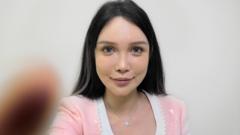More than 100 surgeries later, influencer Abby Wu exemplifies the cosmetic surgery boom in China, where young women increasingly seek enhancements in pursuit of beauty. Yet, beneath the surface glitz lies a troubling reality of unregulated clinics and potential harm from inadequate practitioners, prompting individuals like Yue Yue and Gao Liu to navigate the painful consequences of botched procedures.
The Rising Tide of Cosmetic Surgery in China: Beauty, Risks, and Regrets

The Rising Tide of Cosmetic Surgery in China: Beauty, Risks, and Regrets
The surge in cosmetic procedures in China has transformed beauty standards, driven by social media and shifting cultural perceptions.
In recent years, China has witnessed a remarkable surge in cosmetic surgery, with young women at the forefront, driven by changing beauty standards and the influence of social media. Abby Wu, now 35, epitomizes this phenomenon as one of the country's earliest cosmetic surgery influencers. Her journey began at the age of 14 when consistent pressure from her drama teacher and transformations due to hormones led her to undergo her first procedure, liposuction facilitated by her mother.
Having spent upwards of half a million dollars and undergone over 100 surgeries, Abby remains unapologetic about her extensive journey through the cosmetic landscape. In luxurious surroundings, she continues the monthly routine of face-slimming injections after experiencing complications from previous jaw reduction surgeries. "The surgery worked. I became more confident and happier, day by day," she asserts, clearly unyielding in her pursuit of beauty.
Over the past two decades, societal views regarding appearance have evolved significantly in China, a trend fueled primarily by rising incomes and cultural shifts tailored by online platforms. An alarming statistic indicates that roughly 20 million Chinese individuals seek cosmetic surgery annually, with the overwhelming majority being women aged around 25. Traditional beauty ideals emphasizing Western and animated features have merged with a predilection for exaggerated femininity, as procedures evolve to meet those standards.
Against this backdrop, new innovations in cosmetic apps, like SoYoung, thrive by offering quick face assessments that promote surgical recommendations. Continuous engagement amongst users fuels unrealistic beauty ideals as women share their transformational journeys. However, this phenomenon has led to adverse consequences for some, including rising instances of botched surgeries as clinics proliferate, often without appropriate licensing.
Despite legislative attempts to regulate this industry, unlicensed clinics remain rampant, resulting in numerous accidents. Dr. Yang Lu, a physician operating a licensed clinic in Shanghai, notes a troubling uptick in patients seeking repairs for previous surgeries gone awry, often performed in unregulated spaces. Meanwhile, numerous other stories echo the plight of individuals like Yue Yue, whose desire for beauty at unlicensed clinics resulted in severe complications that impacted both her health and career.
As demand far outstrips supply, with unqualified practitioners entering the fray, cases of scamming young women for surgery loans in exchange for job placements have also come to light. An example includes Da Lan, who was pressured into undergoing surgery by a clinic offering employment, leaving her significantly indebted.
While Abby's confidence shines through the plethora of procedures, the conversations surrounding cosmetic enhancements among her peers reflect a disturbing trend where natural beauty takes a backseat. With an ongoing obsession for perfection driving an industry fraught with danger, the broader implications of these choices—socially, culturally, and medically—continue to unfold across China. However, the allure of beauty remains compelling, with many like Abby Wu vowing never to cease their journey in pursuit of an idealized version of themselves.
Having spent upwards of half a million dollars and undergone over 100 surgeries, Abby remains unapologetic about her extensive journey through the cosmetic landscape. In luxurious surroundings, she continues the monthly routine of face-slimming injections after experiencing complications from previous jaw reduction surgeries. "The surgery worked. I became more confident and happier, day by day," she asserts, clearly unyielding in her pursuit of beauty.
Over the past two decades, societal views regarding appearance have evolved significantly in China, a trend fueled primarily by rising incomes and cultural shifts tailored by online platforms. An alarming statistic indicates that roughly 20 million Chinese individuals seek cosmetic surgery annually, with the overwhelming majority being women aged around 25. Traditional beauty ideals emphasizing Western and animated features have merged with a predilection for exaggerated femininity, as procedures evolve to meet those standards.
Against this backdrop, new innovations in cosmetic apps, like SoYoung, thrive by offering quick face assessments that promote surgical recommendations. Continuous engagement amongst users fuels unrealistic beauty ideals as women share their transformational journeys. However, this phenomenon has led to adverse consequences for some, including rising instances of botched surgeries as clinics proliferate, often without appropriate licensing.
Despite legislative attempts to regulate this industry, unlicensed clinics remain rampant, resulting in numerous accidents. Dr. Yang Lu, a physician operating a licensed clinic in Shanghai, notes a troubling uptick in patients seeking repairs for previous surgeries gone awry, often performed in unregulated spaces. Meanwhile, numerous other stories echo the plight of individuals like Yue Yue, whose desire for beauty at unlicensed clinics resulted in severe complications that impacted both her health and career.
As demand far outstrips supply, with unqualified practitioners entering the fray, cases of scamming young women for surgery loans in exchange for job placements have also come to light. An example includes Da Lan, who was pressured into undergoing surgery by a clinic offering employment, leaving her significantly indebted.
While Abby's confidence shines through the plethora of procedures, the conversations surrounding cosmetic enhancements among her peers reflect a disturbing trend where natural beauty takes a backseat. With an ongoing obsession for perfection driving an industry fraught with danger, the broader implications of these choices—socially, culturally, and medically—continue to unfold across China. However, the allure of beauty remains compelling, with many like Abby Wu vowing never to cease their journey in pursuit of an idealized version of themselves.


















